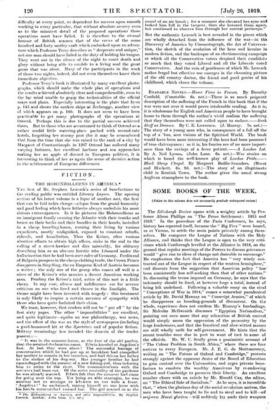FICTION.
THE HOHENZOLLERNS IN AMERICA.* THE first of Mr. Stephen Leacock's series of benefactions to the reading public was entitled Literary Lapses. The opening section of his latest volume is a lapse of another sort, the first that can be hid to his charge—a lapse from the genial humanity and good feeling which have hitherto always underlain his most riotous extravagances. In it he pictures the Holienzollerns as an immigrant family crossing the Atlantic with their trunks and boxes on their backs and their bundles in their hands, installed in a cheap boarding-house,. earning their living by various expedients, mostly undignified, exposed to constant rebuffs, ridicule, and humiliation. Thus the Kaiser, after various- abortive efforts to obtain high offices, sinks in the end to the calling of a street-hawker and dies miserably, his obituary describing him as an obscure lunatic who laboured under the hallucination that he had been once ruler of Germany. Ferdinand of Bulgaria prospers in the cheap-clothing trade, the Crown Prince disappears in Sing-Sing, the ex-Emperor Karl of Austria becomes a waiter ; the only one of the group who comes off well is a niece of the Kaiser's who marries a decent American working man. Pending the Kaiser's trial, satire of this sort is a little cheap; In any case, silence and indifference are far severer criticism on one who lived and throve in the limelight. The theme might have been invested with tragedy : this treatment is only likely to inspire a certain measure of sympathy with those who have quite forfeited their claim.
We trust, however, that readers will not be "put off" by the first sixty pages. The other " impossibilities " are excellent, and quite legitimate—squibs on war .philanthropy, war news, and the effect of the war on the style of newspapers (including
a pod-humoured hit at the Spectator) and of popular fiction. Military terminology has invaded the domain of the tender passion :—
" It was in the summer-house, at the foot of the old garden, that the awaited declaration came. Edwin kneeled at Angelina's feet. At last they were alone ! The successful barrage of conversation which he had put up at breakfast had compelled her 'mother to remain in her trenches, and had driven her father to the shelter of his dug-out. Her younger brother he had camouflaged with the present. of a new fishing-rod, thus inducing him to retire to the river. The communications with the servants had been cut. Of the strict neutrality of the gardener he was already assured. Edwin felt that the moment had come for going over the top. Yet being an able strategist, he was anxious not to attempt to hdvanee on too wide a front. Angelina ! ' he exclaimed, raising himaelf on one knee with his hands outstretched toward her. The girl started as at the • Ths Ilahenzollerna in Anserina, and otter Impossibilities. By Stephen Leacoek. London : John Lane. Di. net.] sound of an air bomb ; for a moment she elevated her .eyes and
looked him full in the tangent., then she lowered thorn again, but continued to observe him through her mental periscope."
But the authentic Leacock is best revealed in the pieces which are wholly detached from the influence of the war—in the Discovery of America by Cinematograph, the Art of Conversa- tion, the sketch of the evolution of the hero and heroine in modern fiction, and the burlesque of an electioneering campaign at which all the Conservative voters despised their candidate so much that they voted Liberal and all the Liberals voted Conservative. And the vein of gentleness of which Mr. Leacack makes frugal but effective use emerges in the charming picture of the old country doctor, the friend and good genius of his childhood, which closes the volume.


































 Previous page
Previous page